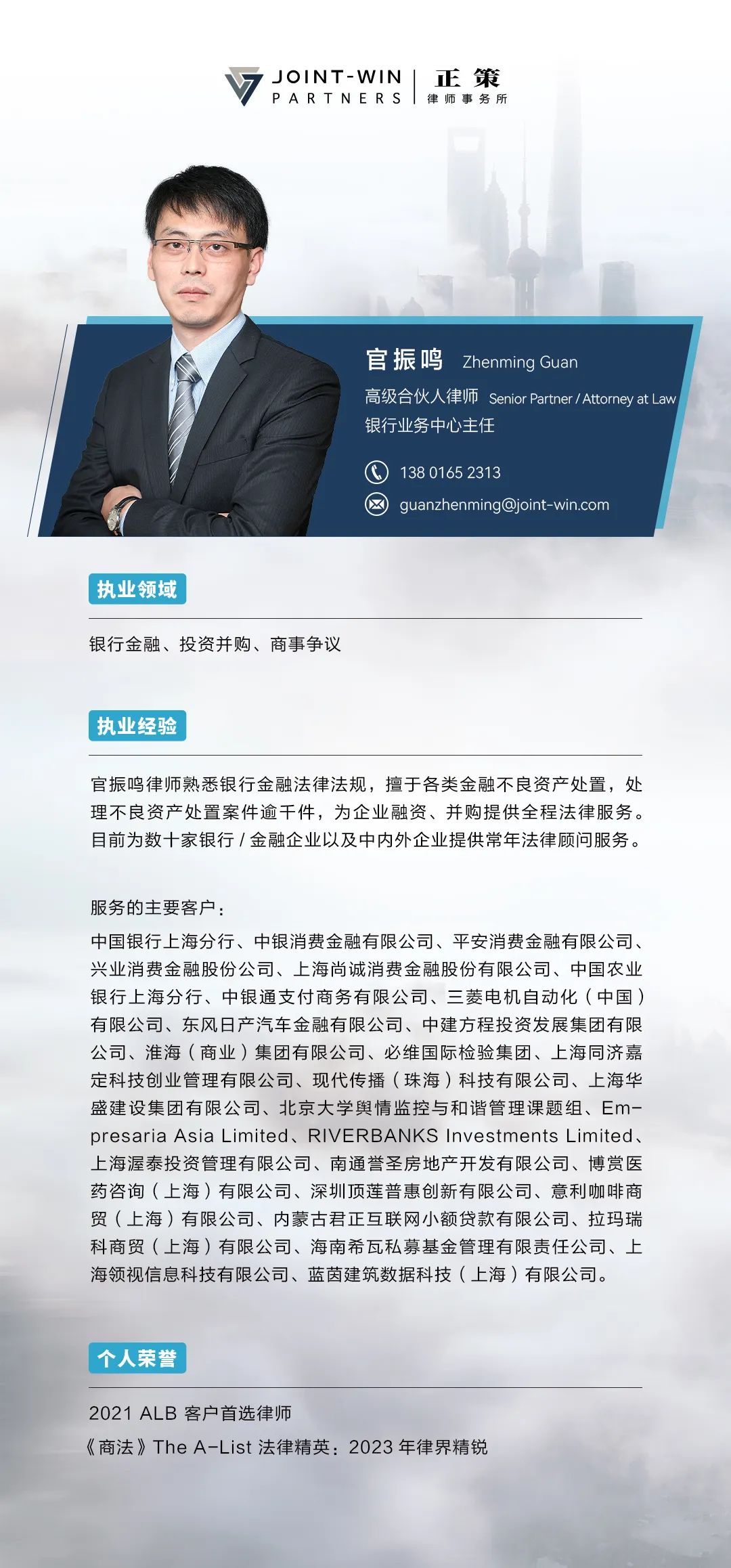正策新闻
正策关注|新规指引金融机构催收工作
近日,中国互联网金融协会同中国银行业协会、中国通信企业协会、中国互联网协会组织相关从业机构共同研制了《互联网金融个人网络消费信贷贷后催收风控指引》国家标准,对有关机构开展贷后催收业务作出细致规定。该标准虽已通过全国金融标准化技术委员会审查,但尚未发布。互联网金融协会为规范当前互联网金融贷后催收业务,结合该标准内容先行发布《互联网金融贷后催收业务指引》(下称《指引》)。本文将基于《指引》内容,向金融机构提出部分合规建议。
To regulate responsible lending and restrained debt collection in internet finance, the National Internet Finance Association (NIFA) has issued new Guidelines for Post-loan Collection Business in Internet Finance.
The guidelines precede ultimate adoption of a national standard for Internet Finance Guidance on Post-loan Collection Risk Control of Online Consumer Lending, which is under development by the NIFA with the China Banking Association, China Association of Communications Enterprises and Internet Society of China – and approved by the National Financial Standardisation Technical Committee – but has not yet been released.
This article highlights compliance recommendations for financial institutions based on the issued guidelines.
强化催收人员管理
Managing collection personnel
(1) 制定选用催收人员的具体标准。有暴力犯罪记录和严重不良信用记录的人员不得被选用为催收人员。
(2) 组织进行催收人员岗前培训与考核。内容包括但不限于金融基础知识、职业道德、作业规范等,要求其签署个人信息安全保密承诺书。
(3) 动态监测催收人员从业行为。及时处理不当的催收行为,发现不适宜从事催收工作的人员,应及时将其调离岗位,发现重大违法违规催收行为的,应及时辞退相关催收人员并向行业自律组织报送相关信息。
(4) 定期对催收人员进行考核与培训。每年对催收人员进行至少一次催收业务、网络安全意识培训和考核,切实提高催收人员的专业能力和职业素养。
(5) 制定合理的绩效评估与奖惩机制。将合规操作、催收效果、信息安全、投诉情况等纳入综合考核。
(6) 要求催收人员不得以催收名义收取额外费用,不得诱导或逼迫债务人通过违法违规的方式筹集资金以偿还债务。
1.Establish specific hiring standards. Individuals with a history of violent crimes or serious negative credit records must not be employed as collection personnel.
2.Organise pre-employment training and assessments for collection personnel, covering topics such as basic financial knowledge, professional ethics and operational standards. Require them to sign a confidentiality agreement regarding personal information.
3.Dynamically monitor the behaviour of collection personnel. Address inappropriate actions promptly. Reassign those unsuitable for collection work and dismiss those involved in significant illegal actions, reporting them to industry self-regulatory organisations.
4.Conduct regular training and assessments for collection personnel at least once a year, covering collection operations and cybersecurity awareness to enhance their professional skills and ethical standards.
5.Develop reasonable performance evaluations and reward mechanisms, incorporating compliance, collection effectiveness, information security and complaint rates.
6.Prohibit collection personnel from charging additional fees or coercing debtors into using illegal means to repay debts.
规范催收作业
Standardising collection
谨慎选取催收对象。催收对象仅限于债务人,只有在符合特定条件时,方可与联系人联系,并应遵循《指引》有关要求。
严守催收时间。如无明确约定,催收作业应在每日早上八点至晚上十点之间进行。
保留催收记录。金融机构应对催收全过程进行记录,委托第三方催收的,应要求其提供完整记录,并将有关记录保存两年以上。此外,金融机构每年自查至少一次自身催收记录,对第三方的催收记录每年定期检查至少一次,并进行不定期突击检查。
落实催收信息披露工作。金融机构应通过官方渠道统一公开委托的第三方催收机构名称、联系方式等有关信息,并及时更新。当债务人问询合作的第三方催收机构情况时,应如实、准确、及时告知。
限制催收频率。通常情况下,语音形式的告知式催收频次每日合计不应超过三次,信函形式的告知式催收间隔周期不宜少于七个自然日,通话形式的交互式催收每日不应超过三次,交互式现场催收每日不应超过一次。
Carefully select collection targets. Collection efforts should be directed solely at debtors. Contacting other individuals is permissible only under specific conditions and must adhere to the above-mentioned guidelines.
Strict adherence to collection hours. Unless explicitly agreed otherwise, collection activities should be conducted between 8am and 10pm daily.
Maintain collection records. Financial institutions should record the entire collection process. When outsourcing to third-party collectors, they must require complete records and retain them for more than two years. Additionally, financial institutions should conduct at least one annual self-audit of their collection records, and also perform at least one regular and one random inspection of third-party collection records annually.
Disclose collection information. Financial institutions should publicly disclose the names and contact details of third-party collection agencies through official channels and update this information regularly. They must provide accurate and timely information to debtors on inquiry about co-operating third-party agencies.
Limit collection frequency. Typically, voice reminders should not exceed three times per day. Written reminders should have at least a seven-day interval. Phone call interactions should not exceed three times per day, and in-person interactions should not exceed once per day.

Emphasising signed agreements
(1) 《指引》要求金融机构在贷款合同或服务协议中对贷款产品的期限、利率、还款安排、逾期可能采取的措施、违约责任、个人信息处理等与催收相关的关键信息进行突出标识(例如加粗、加黑、下划线等),提醒借款人认真、仔细阅读。金融机构应切实践行负责任金融的理念,合规经营,加强金融消费者教育和保护,引导借款人理性借贷、合理规划还款。
(2) 根据《指引》,金融机构可与债务人对催收频率、催收作业时间进行约定。通常情况下,语音形式的告知式催收频次每日合计不应超过三次,通话形式的交互式催收每日不应超过三次,交互式现场催收每日不应超过一次,催收作业不应在每日晚上十点至次日早上八点之间进行,但金融机构与债务人另有约定的除外。
(3) 与第三方催收机构签署相关书面协议。《指引》要求金融机构在委托第三方催收机构进行催收作业前与其签订书面委托协议,明确约定各方权责(含消费者权益保护)、委托范围、委托期限、催收作业要求、个人信息安全管控、风险分担、是否允许业务分包、协议变更或终止的触发条件和过渡安排、违反关于消费者权益保护责任义务的清退标准、纠纷解决机制、违约责任等内容。
1.The guidelines require financial institutions to prominently highlight key information related to collections in loan contracts or service agreements. This includes loan terms, interest rates, repayment arrangements, measures for overdue payments, default responsibilities and personal information handling.
Such information should be marked clearly (e.g. bold, black, underlined) to ensure borrowers read it carefully. Financial institutions should adhere to responsible finance principles, operate in compliance, enhance financial consumer education and protection, and guide borrowers to make rational borrowing decisions and plan repayments reasonably.
2.Agree on collection frequency and timing with debtors. According to the guidelines, financial institutions may agree with debtors on the frequency and timing of collection activities. Generally, voice reminders should not exceed three times per day, phone call interactions should not exceed three times per day, in-person interactions should not exceed once per day, and collection activities should not occur between 10pm and 8am unless otherwise agreed with the debtor.
3.Sign written agreements with third-party collection agencies. The guidelines require financial institutions to sign a written agreement with third-party collection agencies before delegating collection tasks. This agreement must clearly define the responsibilities and rights of each party.This includes: consumer rights protection; the scope and duration of the delegation; collection operation requirements; personal information security controls; risk-sharing; permissions for subcontracting; conditions and transitional arrangements for modifying or terminating the agreement; standards for addressing breaches of consumer protection responsibilities; dispute resolution mechanisms; and liabilities for breach of contract.

Key takeaways
《指引》一经发布即开始施行。有关机构宜认真研读《指引》,贯彻文件要求,保障贷后催收业务之合规性,为《互联网金融个人网络消费信贷贷后催收风控指引》的执行提前布局。
The guidelines address a growing number of payment disputes accompanying growing household debt. They bring more transparency and fairness to the debt collection process and take effect on issuance.
Involved institutions should thoroughly study them, implement the requirements, and ensure compliance in post-loan collection activities, preparing and paving the way for forthcoming enforcement of the Internet Finance Guidance on Post-loan Collection Risk Control of Online Consumer Lending.

















